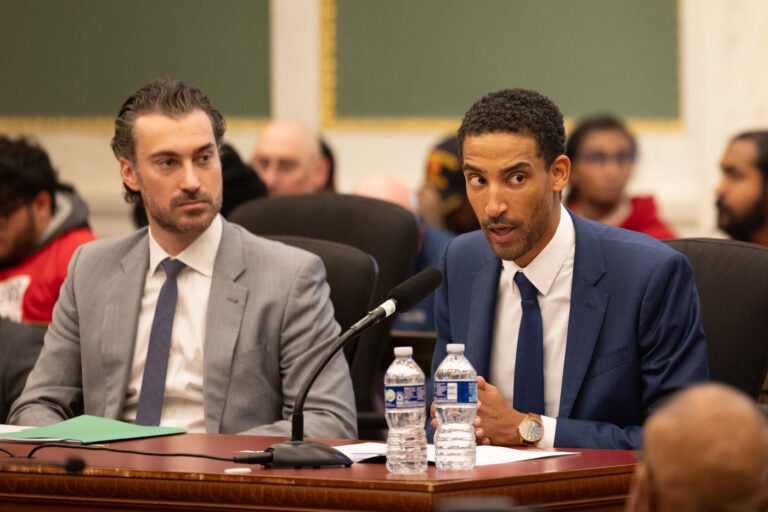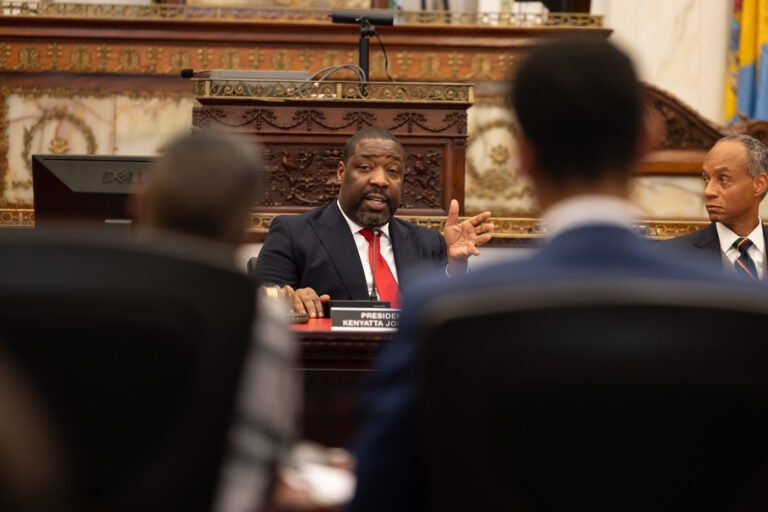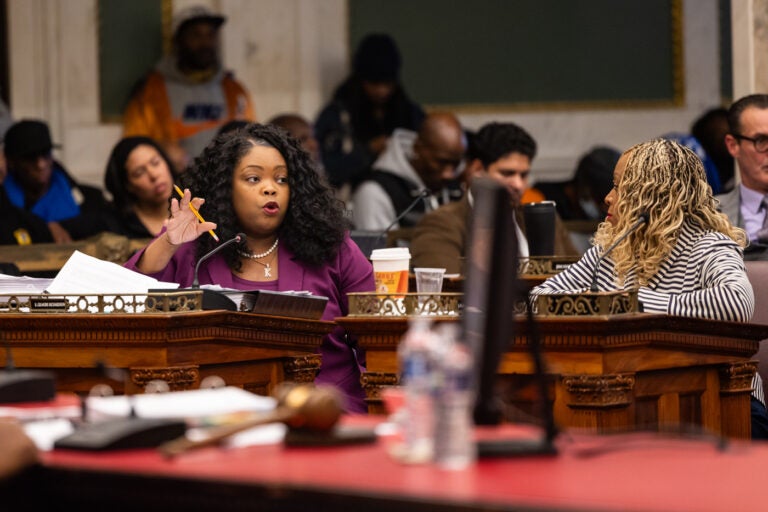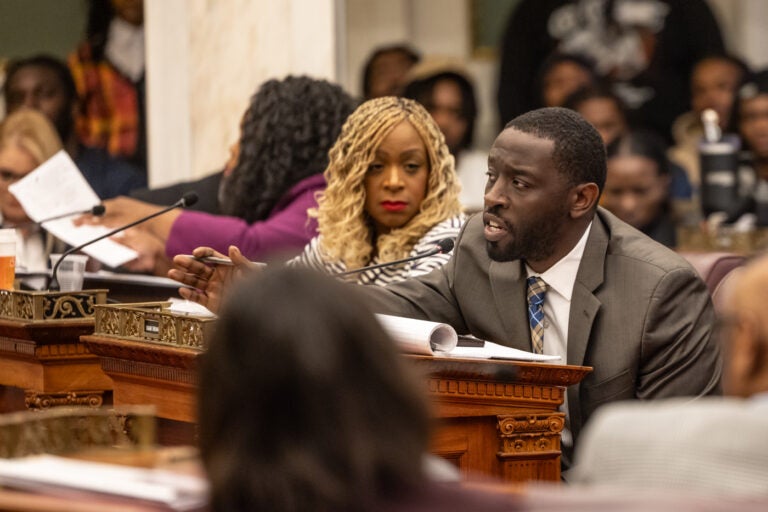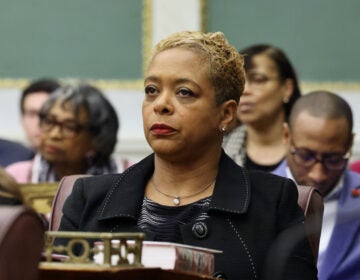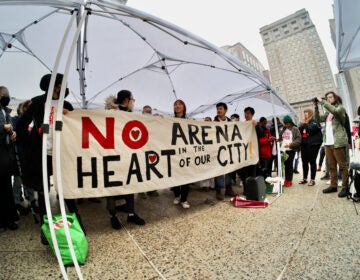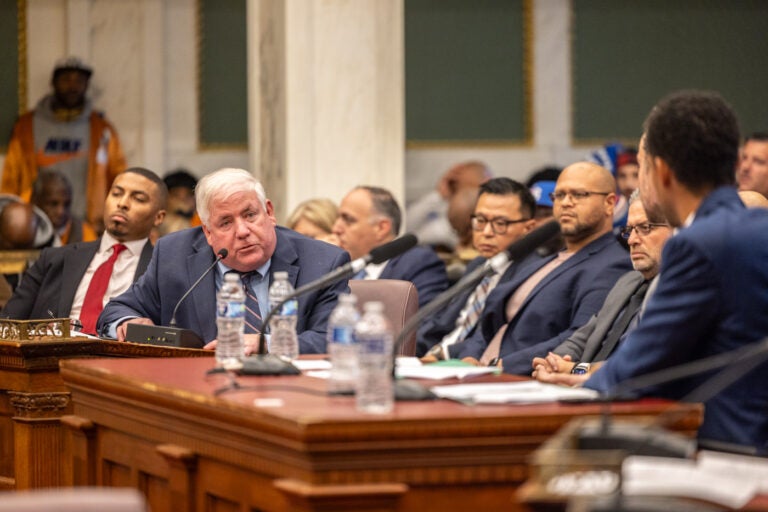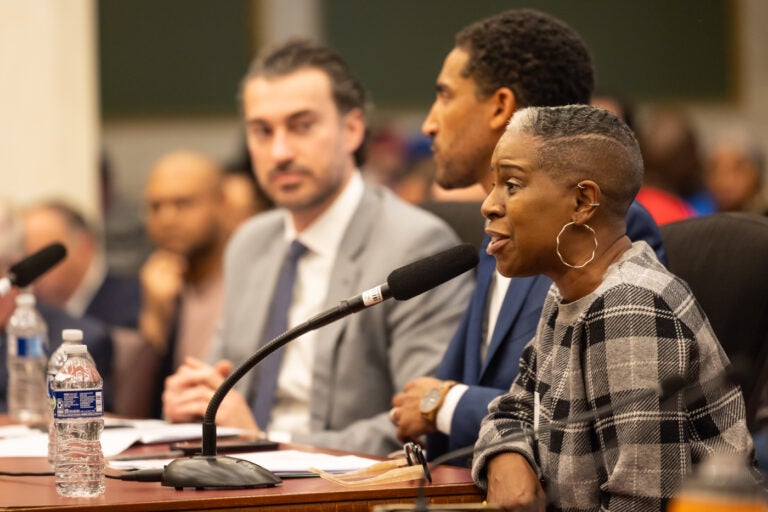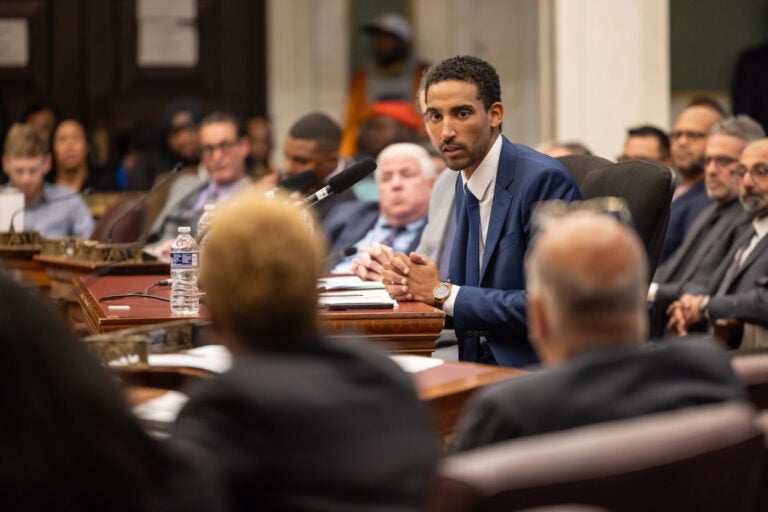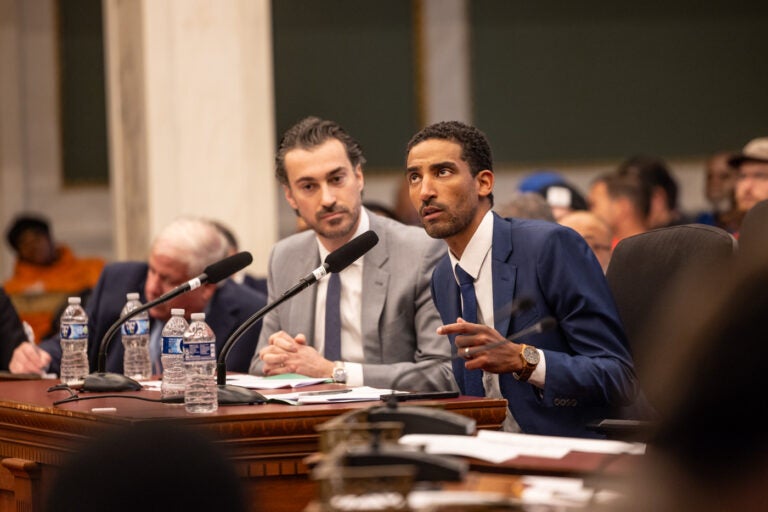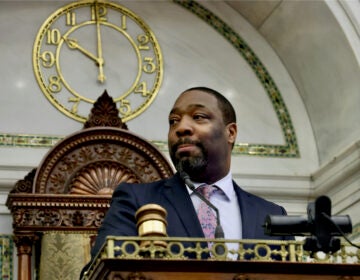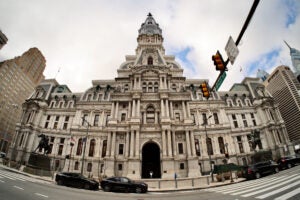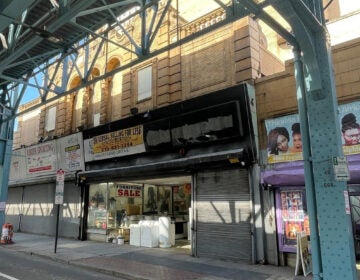SEPTA, community benefits agreement threaten future of the Sixers’ arena proposal
Both sticking points boil down to funding. And it’s unclear if the Sixers are willing to spend more to make the Center City arena a reality.
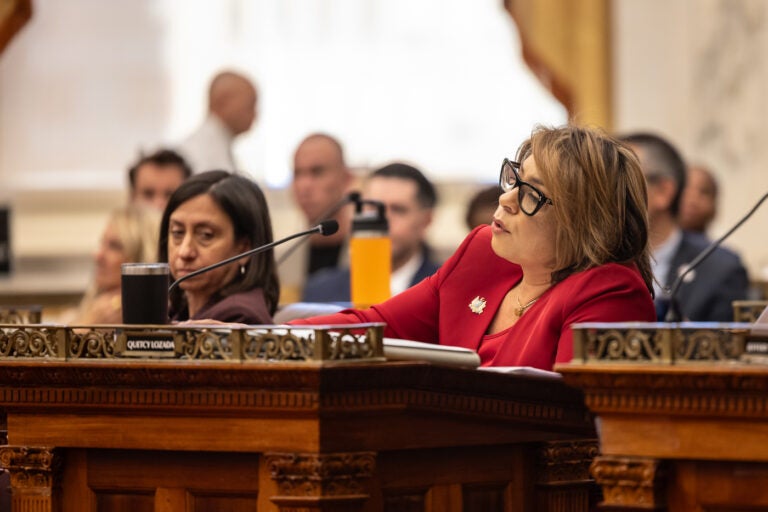
Philadelphia City Councilmember Quetcy Lozado questions Harris Blitzer Sports & Entertainment executives at a hearing devoted to the Sixers’ arena proposal Nov. 13, 2024. (Kimberly Paynter/WHYY)
What you need to know
- The 76ers have proposed moving to a new $1.55 billion arena near Chinatown called “76 Place”
- The proposal has drawn swift condemnation, excitement, skepticism — and plenty of buzz
- Black Clergy of Philadelphia has endorsed the project, while a majority of Chinatown businesses and other community members have voiced their opposition
- Philly Mayor Cherelle Parker formally announced her support for the arena and unveiled a community benefits agreement
For nearly four hours Wednesday, Philadelphia City Council members grilled the 76ers about the team’s $1.3 billion proposal to build a new basketball arena in Center City.
It was the second in a series of public hearings on the privately funded arena. Lawmakers raised concerns about the community benefits agreement the Sixers have committed to; post-game public transportation for fans; and an economic opportunity plan designed to diversify the project’s workforce.
Many of their questions were similar to those posed to Mayor Cherelle Parker’s administration during a related hearing Tuesday. But council members took an icier tone and appeared far more impatient with team officials, in part because important components of the proposal had yet to be finalized.
“Here we are, we’re ready to figure out what we’re gonna do here, and some of these things really should have been nailed down,” Councilmember Cindy Bass said.

The Sixers say they need Council’s approval before the end of the year if the project is to stay on track.
The team wants to open the 18,500-seat facility in 2031, the year its lease ends at the Wells Fargo Center in South Philadelphia. And while it continues to entertain the possibility of moving the project to New Jersey, opening a new arena in the city remains its top priority.
“We are already behind on where we would need to be for this site,” said Alex Kafenbaum, head of development for Harris Blitzer Sports & Entertainment, which owns the Sixers.
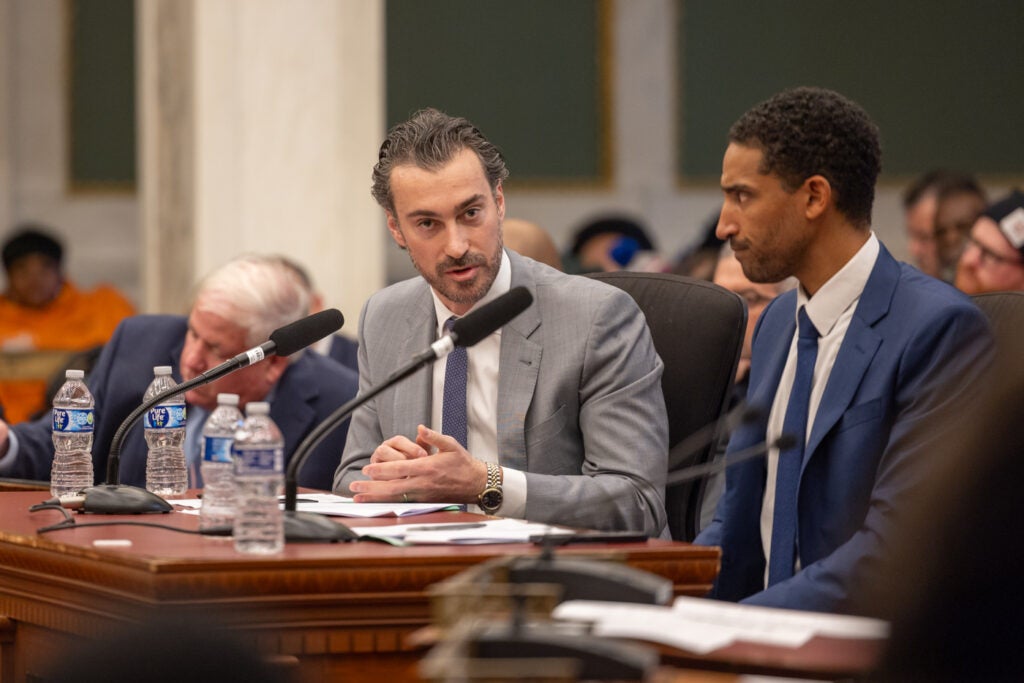
The team’s timeline would give lawmakers a total of three weeks to deliberate and decide the fate of the controversial development — unless additional legislative sessions are added to the calendar before the body breaks for the holidays.
For now, the final session is scheduled for Dec. 12.
Sticking points
On Wednesday, lawmakers continued to dissect the community benefits agreement the Sixers negotiated as part of a broader deal with Parker, who has given her full-throated support to the arena.
The legally binding document includes $50 million for an array of citywide initiatives and programs, as well as efforts designed to mitigate concerns raised by neighborhoods that will be directly impacted by the arena, including Chinatown, where most residents fiercely oppose the arena.
David Gould, Harris Blitzer’s chief corporate affairs officer, told lawmakers the Sixers would not be willing to raise the cap of the CBA.
“Fifty million [dollars] is the number we can support. We can’t go above that,” he said.
Councilmember Mark Squilla, whose district includes the proposed site, said Wednesday that the project could stall in Council if the Sixers refuse to alter the agreement.
Nine votes are needed to pass authorizing legislation out of committee.
“I didn’t get a count but it doesn’t seem like [there are enough votes],” Squilla said.
Lawmakers also asked Gould and Kafenbaum if they thought the agreement contained enough safeguards for neighborhoods directly impacted by the construction and operation of the proposed arena.
Councilmember Jim Harrity called a $1.6 million initiative to support small businesses an inadequate program given that Chinatown is home to hundreds of independent storefronts.
Councilmember Jamie Gauthier questioned whether the agreement provided an adequate “safety net” for Chinatown residents and business owners, many of whom fear the arena will displace them.
Gould gave a global response.
“There is no single developer that will be able to guarantee … the preservation of any neighborhood. We are very excited and supportive and look to collaborate with how we can leverage the funds in the community benefits agreement with the tools that the city has at its disposal to best protect and preserve Chinatown,” he said.
During the hearing, council members continued to seek clarity on the Sixers’ discussions with SEPTA.
The arena will sit on top of Jefferson Station, and the team expects 40% of fans will travel to games via public transportation.
The administration testified Tuesday that SEPTA would need to run additional trains on its Regional Rail lines for the team to hit that goal. It’s unclear, however, where funding for that expansion will come from.
SEPTA announced plans to increase fare prices and make severe service cuts in the face of a fiscal crisis. The authority is also in the midst of negotiating a new contract with its largest bargaining unit, which is calling for higher wages, among other demands.
The administration has said the city has no plans to send more taxpayer dollars SEPTA’s way.
And on Wednesday, it came to light that the Sixers also do not intend to subsidize the authority’s operating costs for additional trains. Team officials said they would only cover costs connected to the physical impact of the arena on Jefferson Station.
“We think we can be helpful and be a problem-solving partner to SEPTA and the city and state in this conversation,” Kafenbaum said.
SEPTA declined to comment.
What’s next?
Before breaking for lunch, council members pressed team officials about the demolition phase of the project. That work could begin in 2026 when Philadelphia will host the nation’s Semiquincentennial celebration, matches part of the FIFA World Cup and the MLB All-Star game, among other events.
“All our hard work is going into this and the last thing we need is business interruptions for Center City,” said Councilmember Michael Driscoll.
Kafenbaum told lawmakers the team would seek to “minimize” the impacts of the demolition process, but assured them it would be worth it.
The Sixers say the arena will generate nearly $1 billion in net new tax revenue for the city and its school district, create hundreds of jobs and help revitalize the blocks of Market east of City Hall, a disjointed stretch that has struggled to thrive for decades.
“The investment is gonna bring activity. It’s gonna bring dollars to the area, which is going to help build and give a reason for other developments that have long been stalled … to build something of their own,” Kafenbaum said.
For the arena to become a reality, Council must pass a legislative package containing the approvals the Sixers need to start construction.
The package contains bills related to zoning and planning, as well as measures related to an existing neighborhood improvement district and financial arrangements tied to the Fashion District mall.
Under its agreement with the city, the Sixers will not pay real estate taxes. Instead, the team will make PILOTS — payments in lieu of taxes — to the city, which critics say amounts to a subsidy because the payments will be cheaper than what the Sixers would lay out for taxes if they owned the land.
Council is also considering two bills introduced by Squilla. One would create a special services district around the arena, a measure designed to give nearby residents some agency when it comes to the conduct of the arena. The other would create a new zoning overlay for Chinatown, to preserve the scale of the neighborhood.
Public hearings on the arena are scheduled to wrap up Dec. 3.
 This story is a part of Every Voice, Every Vote, a collaborative project managed by The Lenfest Institute for Journalism. The William Penn Foundation provides lead support for Every Voice, Every Vote in 2024 and 2025 with additional funding from The Lenfest Institute for Journalism, Comcast NBC Universal, The John S. and James L. Knight Foundation, Henry L. Kimelman Family Foundation, Judy and Peter Leone, Arctos Foundation, Wyncote Foundation, 25th Century Foundation, and Dolfinger-McMahon Foundation.
This story is a part of Every Voice, Every Vote, a collaborative project managed by The Lenfest Institute for Journalism. The William Penn Foundation provides lead support for Every Voice, Every Vote in 2024 and 2025 with additional funding from The Lenfest Institute for Journalism, Comcast NBC Universal, The John S. and James L. Knight Foundation, Henry L. Kimelman Family Foundation, Judy and Peter Leone, Arctos Foundation, Wyncote Foundation, 25th Century Foundation, and Dolfinger-McMahon Foundation.
To learn more about the project and view a full list of supporters, visit www.everyvoice-everyvote.org. Editorial content is created independently of the project’s donors.

Subscribe to PlanPhilly
WHYY is your source for fact-based, in-depth journalism and information. As a nonprofit organization, we rely on financial support from readers like you. Please give today.




